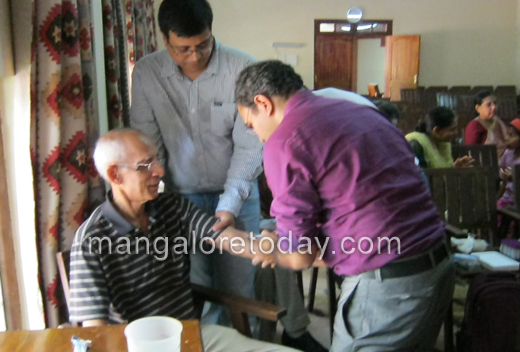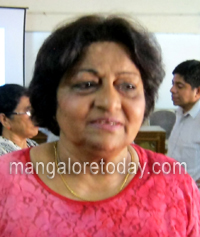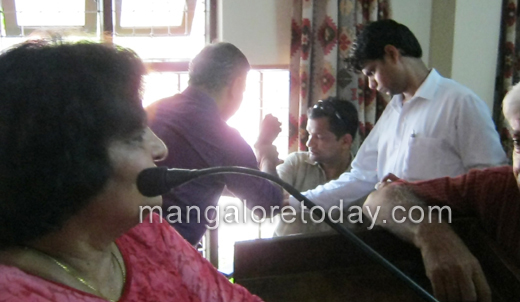Origins of Konkaniís - A HISTORICAL RESEARCH
Origins of Konkaniís - A HISTORICAL RESEARCH
Mangalore Today News Network
Mangalore, June 15, 2014: Till recent times the Konkani speaking communities of the West Coast have been resting on the fact that history confirms their Aryan descent in a Dravidian land and their disbursement from the now unseen River "Saraswati" a tributary of the River Sind when it became non-existent centuries ago. It was understood that the Aryan’s of Sind probably carried ’Greek’ genes. In the last five hundred years these Konkani speakers known to be Brahman Hindus have evolved into Muslims and Catholics too as is seen. These descendants of ancient Goud saraswat Brahmins (GSBs) today are spread all over the world intermingling with multi ethnic and linguistic societies. An established and well known Historian from the Konkani Catholic Community based in Mumbai, is set to soon come out with a book that traces back the ethnicity of Konkani speakers to Jewish Biblical roots - historical research is ever an on-going proposal.

A complex project is under way and one segment of it is to possibly trace the earlier origins of the Konkani speakers before their sojourn on the banks of river Saraswati. Vague theories are a plenty some of them may have a basis. But, to set a bonafide direction twenty first century Scientists and researchers have many new tools presently. The latest genetic and computational technologies to analyze patterns in DNA from participants around the South West Coastal region of India are one of them.
Dr.Kranti K Farias and her work: Dr. Kranti K. Farias is a former President of The Church History Association of India. Her doctoral work, entitled “The Christian Impact in South Kanara” was published in 1999; it is a work worth a read by all interested in the general ’History of South Kanara’. She has published several articles and papers on Indian Nationalism, Indian Christians and Indian Jewish communities in India, Israel and Canada. It may be noted she is the daughter of Cyprian and Alice Alvares who resided in Bombay (Mumbai) and were active in Indian freedom struggle (I believe that is the reason she has the name "Kranti", meaning ’revolution’). Responding to the call of ’Civil disobedience movement 1942 - the Quit India movement’ against British rule, the Alvares couple were detained in jails on several occasions, like many freedom fighters, their lives have been worthwhile.
Dr. Kranti K. Farias is a former President of The Church History Association of India. Her doctoral work, entitled “The Christian Impact in South Kanara” was published in 1999; it is a work worth a read by all interested in the general ’History of South Kanara’. She has published several articles and papers on Indian Nationalism, Indian Christians and Indian Jewish communities in India, Israel and Canada. It may be noted she is the daughter of Cyprian and Alice Alvares who resided in Bombay (Mumbai) and were active in Indian freedom struggle (I believe that is the reason she has the name "Kranti", meaning ’revolution’). Responding to the call of ’Civil disobedience movement 1942 - the Quit India movement’ against British rule, the Alvares couple were detained in jails on several occasions, like many freedom fighters, their lives have been worthwhile.
Dr. Kranti’s current area of research is the history of the Jewish communities in India and the Diaspora with special focus on the B’nei Menashe of North East India (Manipur & Mizoram 2.States) and the Bene Ephraim (Telugu Jews of Hyderabad, Andhra Pradesh State, South India). She was Principal of St. Aloysius Gonzaga High School and Modern Indian School in Mumbai. She lectured at the St. Xavier’s College and R. D. National College in History and Political Science and was also a Lecturer-Teacher Educator at the Rizvi College of Education, all in Mumbai.
She is working on a book on cultural comparison of the Indian Jewish and Indian Christian Communities. This will be an interesting exposé of two Semitic communities living in harmony in India, knowledgeable about their roots and proud of their heritage. The book is awaited with great expectations.
Progressive Thinking:
Around five years ago, Dr.Farias began to look into the Jewish traditions behind her own Christian faith. Her interest was reinforced by a friend of hers who was a member of the ’Bene Israel’, India’s acknowledged Jewish community, who subsequently moved to Israel.
“I made quite a deep study of Indian Jews, focusing on the nexus between Judaism and Christianity and on the Hindu influences on Jewish life", she explained. Although there are now only about 4,000 to 5,000 of Bene Israel remaining in India, mostly in Mumbai and Delhi some have risen to prominence in Indian society. One, Elijah Moses, even served as mayor of Mumbai, she said.
Schools and synagogues serve the community, whose own traditions trace their presence in India to early history, when seven men and an equal number of women survived a shipwreck. They formed the basis of a community that has persisted for 2,000 years, during which time they lived free of prejudice or discrimination, she said. Living apart from the wider Jewish world, they first reconnected when a trader from Cochin – whose own tradition traces their roots in India to Solomonic times – arrived in the 12th century and “was informed about a peculiar people who keep holiness of Saturday.”
Devising a test, the businessman “placed a basket of fish before them and saw they separated them – scaled versus non-scaled,” just as the laws of kashrut mandated. “He thought they were Jews.” At the time, the Jews were known in the local dialect as “the Saturday oil men,” because they followed a traditional method of making vegetable oil. When India turned over Mumbai to the British, Jews moved from nearby Alibag and have resided in the Indian city since, Dr. Kranti said. “They considered India their motherland, but felt they had to go back to the fatherland,” she added.

Connecting Objectives:
India makes up around one-sixth of the world’s population, yet the South Asian country has been sorely under-represented in genome-wide studies of human genetic variation. In many recent studies, it was found that several disorders like cardiomyopathy, hypertension and diabetes are directly correlated with the ethnicity of a population. Our Project is an ambitious attempt to co-relate the population linguistics with its genetic makeup. Further, to understand the ancestry of a particular population and from where they originated. Using the latest genetic and computational technologies to analyze historical patterns in DNA from participants around the South West Coastal region of India, our team of world-renowned scientists from "Centre for Cellular and Molecular Biology" (CCMB), Hyderabad, seeks to reveal the migratory history and to better understand the connections with the susceptibility of several genetic disorders. During their recent visit to Mangalore, Udupi, Karwar and Goa they collected samples from volunteers to move the dual research objectives forward.
Dr. Kranti Kiran Farias, historian in Medieval and Modern History of India will collaborate in this study with Historical evidence by way of researching on Primary Sources as available, such as Government, Church and Private (Family) records as well as archaeological evidence. Going beyond the Saraswati River is the thrust of her research on the migratory people to Goa, North Kanara (Karwar), South Kanara (Mangalore, Udipi, etc) and Goa.
The three lead scholars of the project are: * Dr. K. Thangaraj, Senior Principal Scientist, CCMB, Hyderabad. * Dr. Kranti K. Farias : Historian, Mumbai Post Doctoral Research Fellow Former Fellow, Heras Institute. * Dr. Niraj Rai: CCMB, Hyderabad & Asiatic Institute, Mumbai. Indeed the potential is enormous and interested people are eagerly awaiting the out come and the book from Dr.Kranti Kiran Farias.
Compiled By I J Saldanha Shet. With inputs from various sources.
- Need For ‚ÄėStudents, Alcohol and Drugs‚Äô survey
- New Synthetic Drugs Trapping Youth
- Mood Modifying Chips - Future of Drug Use
- Ramping up Indo-Bangla border security
- IITM- A premier educational Institution in a forest. What can we learn?
- Former PM, Manmohan Singh: Notable laws passed under his tenure
- Hashish on Ratnagiri Seashore
- The Poor cry out to Us: Do we respond?
- Clandestine Meth Labs Sprouting Across India
- Hydro ganja from Bangkok latest craze among youth in India
- "Memories to Treasure" Dr.Michael Lobo’s new book
- Dominance of Private Universities: Will it make education inaccessible to underprivileged students?
- Monti Phest: A rich heritage of South Canara
- Kashmir Bhavan in Bengaluru: A must visit place
- "MAI and I" Book of Angelic Emotions
- Draupadi Murmu - The New ’President of India’
- Anthony Ashram in the city grows a classic museum
- First College of Fisheries in India - A Golden Jubilarian
- Flushing Meadows - A Vintage Mansion
- The Colonelís Bequest
- A Mangalorean PM and his RBI Governor Brother: The Extraordinary story of the Benegal Brothers
- There is no higher religion than Truth: Theosophical Society
- Líaffaire - Ashu & Yiju of Mangalore
- Mangalore in Kowloon
- 1568 to 2018 AD: 450 years of Christianity in Mangaluru
- Vice President elect Naidu moves on from nadir to zenith, the phenomenal journey
- Embracing the Outdoors: How Heated Jackets Are Revolutionizing Cold Weather Activities
- Efficient and Sustainable Packaging Solutions with FIBCs
- The Hybrid Kilt Revolution | Where Tradition Gets Trendy
- Affordable Elegance | Embrace Style on a Budget with Cheap Kilts
- Unleashing Style and Functionality | Exploring Tactical Kilts
- Mangalore’s Heroic Lady marks 105th Birthday
- Santa the Christmas spirit
- Geriatric care: Mangalore strikes a fine balance
- The Don Who Made Two Empires to Clash
- CHITRAPUR SARASWATS - A Great Kanara Community
- Our new President Ram Nath Kovind’s significant journey to Rashtrapathi Bhavan
- Marriages made in heaven, big fat weddings made in India
- Eid insight - The giver of glad tidings
| Comments on this Article | |
| Jayashree Rao, Bantwal, South Kanara/New Orleans, USA | Thu, April-8-2021, 3:58 |
| I am a physician / scientist and very interested in this study. Would like to know if there are published results of the research. Please respond to Jayashree Rao at bjkr747@gmail.com. Thank you. | |
- CITY INFORMATION
- TRAVEL
- TOURIST INFORMATION
- HEALTH CARE
- MISCELLANEOUS




 Write Comment
Write Comment E-Mail To a Friend
E-Mail To a Friend Facebook
Facebook Twitter
Twitter  Print
Print 


